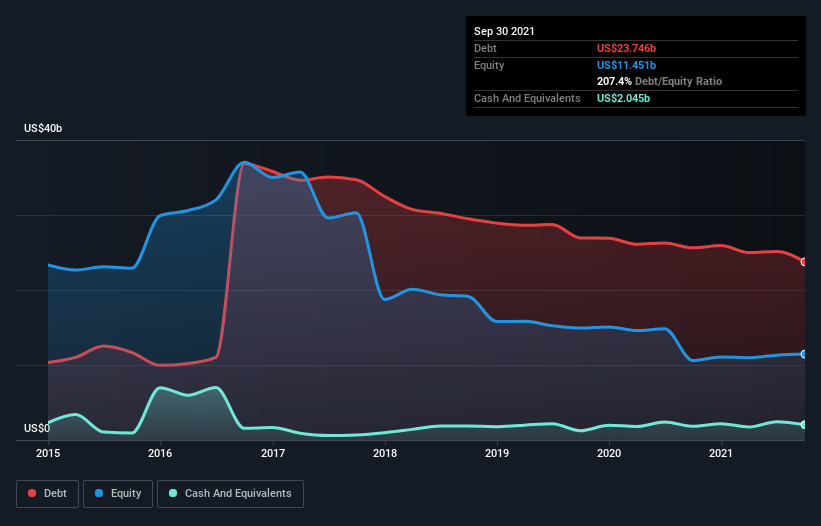- United States
- /
- Pharma
- /
- NYSE:TEVA
Teva Pharmaceutical Industries (NYSE:TEVA) Seems To Be Using A Lot Of Debt

Legendary fund manager Li Lu (who Charlie Munger backed) once said, 'The biggest investment risk is not the volatility of prices, but whether you will suffer a permanent loss of capital.' It's only natural to consider a company's balance sheet when you examine how risky it is, since debt is often involved when a business collapses. Importantly, Teva Pharmaceutical Industries Limited (NYSE:TEVA) does carry debt. But is this debt a concern to shareholders?
Why Does Debt Bring Risk?
Debt and other liabilities become risky for a business when it cannot easily fulfill those obligations, either with free cash flow or by raising capital at an attractive price. If things get really bad, the lenders can take control of the business. While that is not too common, we often do see indebted companies permanently diluting shareholders because lenders force them to raise capital at a distressed price. Having said that, the most common situation is where a company manages its debt reasonably well - and to its own advantage. The first thing to do when considering how much debt a business uses is to look at its cash and debt together.
See our latest analysis for Teva Pharmaceutical Industries
How Much Debt Does Teva Pharmaceutical Industries Carry?
As you can see below, Teva Pharmaceutical Industries had US$23.7b of debt at September 2021, down from US$25.6b a year prior. On the flip side, it has US$2.05b in cash leading to net debt of about US$21.7b.

How Strong Is Teva Pharmaceutical Industries' Balance Sheet?
Zooming in on the latest balance sheet data, we can see that Teva Pharmaceutical Industries had liabilities of US$11.8b due within 12 months and liabilities of US$24.6b due beyond that. On the other hand, it had cash of US$2.05b and US$4.05b worth of receivables due within a year. So its liabilities outweigh the sum of its cash and (near-term) receivables by US$30.3b.
This deficit casts a shadow over the US$9.09b company, like a colossus towering over mere mortals. So we'd watch its balance sheet closely, without a doubt. After all, Teva Pharmaceutical Industries would likely require a major re-capitalisation if it had to pay its creditors today.
We use two main ratios to inform us about debt levels relative to earnings. The first is net debt divided by earnings before interest, tax, depreciation, and amortization (EBITDA), while the second is how many times its earnings before interest and tax (EBIT) covers its interest expense (or its interest cover, for short). This way, we consider both the absolute quantum of the debt, as well as the interest rates paid on it.
With a net debt to EBITDA ratio of 5.1, it's fair to say Teva Pharmaceutical Industries does have a significant amount of debt. However, its interest coverage of 3.1 is reasonably strong, which is a good sign. Even more troubling is the fact that Teva Pharmaceutical Industries actually let its EBIT decrease by 4.7% over the last year. If it keeps going like that paying off its debt will be like running on a treadmill -- a lot of effort for not much advancement. There's no doubt that we learn most about debt from the balance sheet. But ultimately the future profitability of the business will decide if Teva Pharmaceutical Industries can strengthen its balance sheet over time. So if you want to see what the professionals think, you might find this free report on analyst profit forecasts to be interesting.
Finally, a company can only pay off debt with cold hard cash, not accounting profits. So we always check how much of that EBIT is translated into free cash flow. In the last three years, Teva Pharmaceutical Industries created free cash flow amounting to 11% of its EBIT, an uninspiring performance. For us, cash conversion that low sparks a little paranoia about is ability to extinguish debt.
Our View
On the face of it, Teva Pharmaceutical Industries's net debt to EBITDA left us tentative about the stock, and its level of total liabilities was no more enticing than the one empty restaurant on the busiest night of the year. And furthermore, its interest cover also fails to instill confidence. After considering the datapoints discussed, we think Teva Pharmaceutical Industries has too much debt. That sort of riskiness is ok for some, but it certainly doesn't float our boat. There's no doubt that we learn most about debt from the balance sheet. However, not all investment risk resides within the balance sheet - far from it. For example Teva Pharmaceutical Industries has 2 warning signs (and 1 which doesn't sit too well with us) we think you should know about.
If, after all that, you're more interested in a fast growing company with a rock-solid balance sheet, then check out our list of net cash growth stocks without delay.
If you're looking to trade Teva Pharmaceutical Industries, open an account with the lowest-cost platform trusted by professionals, Interactive Brokers.
With clients in over 200 countries and territories, and access to 160 markets, IBKR lets you trade stocks, options, futures, forex, bonds and funds from a single integrated account.
Enjoy no hidden fees, no account minimums, and FX conversion rates as low as 0.03%, far better than what most brokers offer.
Sponsored ContentValuation is complex, but we're here to simplify it.
Discover if Teva Pharmaceutical Industries might be undervalued or overvalued with our detailed analysis, featuring fair value estimates, potential risks, dividends, insider trades, and its financial condition.
Access Free AnalysisHave feedback on this article? Concerned about the content? Get in touch with us directly. Alternatively, email editorial-team (at) simplywallst.com.
This article by Simply Wall St is general in nature. We provide commentary based on historical data and analyst forecasts only using an unbiased methodology and our articles are not intended to be financial advice. It does not constitute a recommendation to buy or sell any stock, and does not take account of your objectives, or your financial situation. We aim to bring you long-term focused analysis driven by fundamental data. Note that our analysis may not factor in the latest price-sensitive company announcements or qualitative material. Simply Wall St has no position in any stocks mentioned.
About NYSE:TEVA
Teva Pharmaceutical Industries
Develops, manufactures, markets, and distributes generic and other medicines, and biopharmaceutical products in the United States, Europe, Israel, and internationally.
Very undervalued with reasonable growth potential.
Similar Companies
Market Insights
Community Narratives



